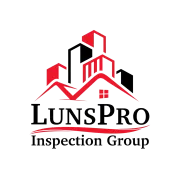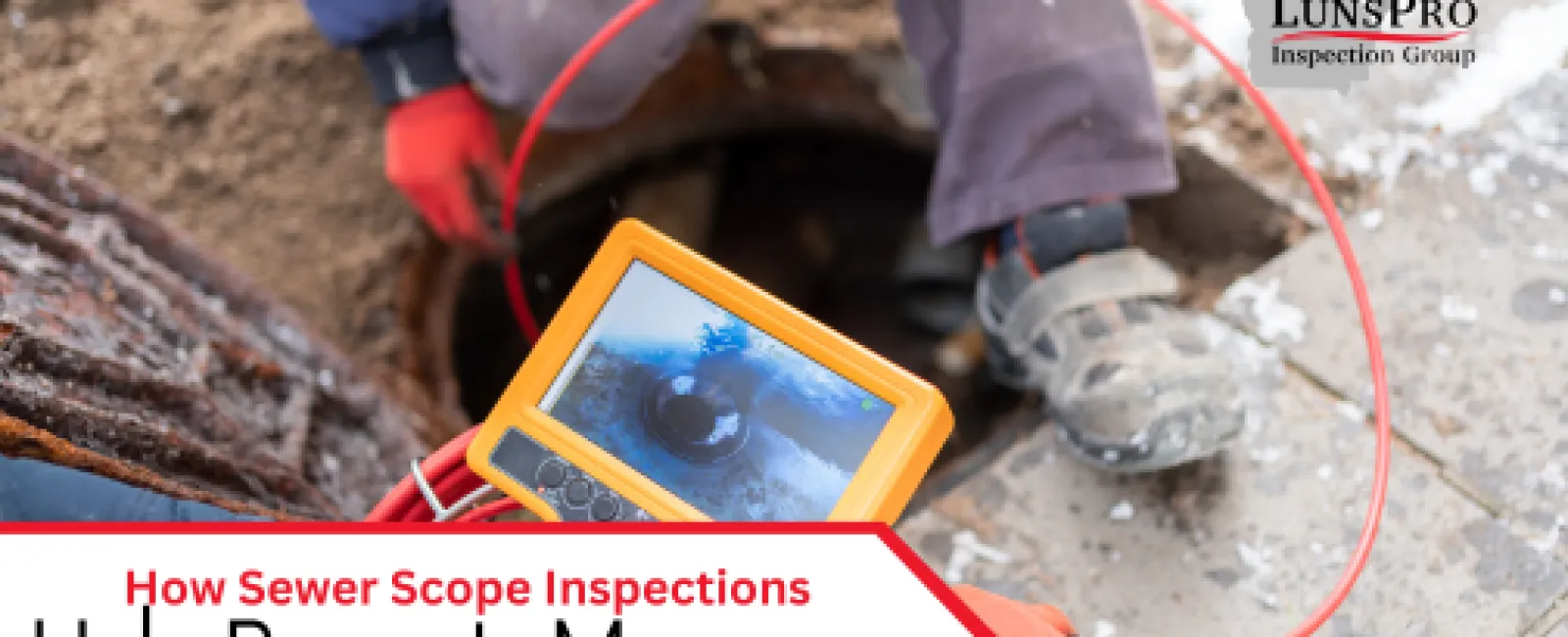Sewer lines aren't something most property managers think about—until something goes wrong. A backed-up sewer, collapsed pipe, or undetected leak can result in thousands of dollars in repairs, damaged flooring or foundations, and unhappy tenants. These emergencies are disruptive, expensive, and often preventable with proper planning.
That's why sewer scope inspections are a critical, proactive tool for property managers and real estate professionals managing multi-unit or commercial buildings across Georgia. At LunsPro Inspection Group, we've conducted hundreds of Atlanta, Alpharetta, and Athens Residential and Commercial Inspections that include detailed sewer evaluations. For properties in the Metro Areas, where aging infrastructure and soil conditions can compound plumbing risks, sewer scopes are a smart way to uncover hidden problems before they become catastrophic failures.
In this article, we break down what a sewer scope inspection is, how it works, and why it should be part of your regular maintenance strategy—especially if you're a property manager focused on avoiding costly emergencies and protecting the integrity of your buildings.
What Is a Sewer Scope Inspection?
A sewer scope inspection is a specialized diagnostic service where a small waterproof camera is inserted into a property's main sewer line. The camera is snaked through the pipe, usually starting at a cleanout or access point, and provides a real-time video feed of the condition inside the sewer system.
This inspection helps reveal issues such as:
Pipe cracks or collapse
Tree root intrusion
Grease or debris buildup
Misaligned or offset joints
Corrosion or scaling in older cast iron pipes
Low spots or "bellies" where water and waste accumulate
Improper materials or amateur repairs
The entire process typically takes less than an hour but can provide invaluable insight into the plumbing health of a property—especially in buildings with long-standing occupancy or no recent inspection history.
Why Sewer Scope Inspections Are Crucial in Georgia
Across the Metro Areas, many properties—especially those in older parts of Atlanta, Alpharetta, and Athens—still rely on original sewer systems made of cast iron, clay, or Orangeburg (a bituminous fiber material used in mid-20th-century construction). These materials degrade over time, leading to failures that can be both sudden and severe.
Additionally, Georgia's expansive clay soils and frequent rain events create a challenging environment for buried pipes. Soil movement can cause shifting, cracking, or joint separation in sewer lines. Over time, this leads to leaks or backups that can compromise not just the plumbing but also a building's foundation.
By integrating sewer scopes into routine Georgia home inspections, property managers can stay ahead of these issues and ensure systems are safe, compliant, and functional.
Top Sewer Issues Uncovered in Commercial & Multi-Unit Properties
Property managers overseeing apartment complexes, office buildings, or mixed-use developments face unique challenges with their plumbing systems. Here are the most common issues we identify during commercial sewer inspections:
1. Tree Root Intrusion
Roots seek moisture and can enter through tiny cracks or joints in clay or cast iron pipes.
Once inside, roots grow quickly, leading to full blockages or collapsed pipes.
2. Pipe Corrosion
Especially common in cast iron systems.
Corrosion reduces flow and eventually leads to leaks or structural failure.
3. Grease & Debris Buildup
Often seen in properties with commercial kitchens, restaurants, or high usage.
Without regular cleaning, buildup can lead to slow drainage and complete stoppages.
4. Bellies and Low Points
Poor installation or settling soil can cause dips in the line.
These areas trap waste and water, increasing the risk of backups.
5. Previous Poor Repairs
Unpermitted or DIY repairs using incompatible materials can lead to leaks or system incompatibility.
We often see patched sections that fail under moderate pressure.
Unaddressed, any of these issues can quickly escalate into emergencies that displace tenants, damage property, and result in significant out-of-pocket expenses for the property owner.
How Sewer Issues Can Impact Foundations
While sewer failures are often treated as plumbing issues, they frequently impact the structural integrity of the building itself—particularly its foundation. A leaking sewer line beneath a slab or crawl space can saturate the soil, causing erosion or expansion that leads to:
Foundation cracks
Differential settlement
Interior wall or floor damage
Structural shifting
For property managers in Atlanta, Alpharetta, and Athens, incorporating sewer scopes into broader inspection protocols is not just about protecting pipes—it's about safeguarding the building's most essential structure.
When Should a Property Manager Schedule a Sewer Scope?
Sewer scope inspections are beneficial in a range of scenarios. Here are some key times when property managers should prioritize one:
1. Before Acquiring a New Property
As part of a Georgia home inspection or commercial due diligence review, a sewer scope helps identify unseen liabilities.
2. When Tenants Report Drainage Issues
Slow drains, recurring clogs, or sewage smells often point to deeper problems below the surface.
3. After Major Storms or Flooding
Excess water can shift soil and stress pipes. A sewer scope provides peace of mind that systems remain intact.
4. On Older Properties (25+ years)
Aging infrastructure should be evaluated regularly, even if no issues are currently reported.
5. Before Major Renovations
If you're planning to add bathrooms, kitchens, or increase occupancy, verifying sewer line capacity and condition is critical.
Benefits of Sewer Scope Inspections for Property Managers
1. Avoid Emergency Repairs
Catching issues early can prevent sudden pipe failures, costly emergency response calls, and building shutdowns.
2. Improve Tenant Satisfaction
Few things create tenant dissatisfaction like sewage backups or foul odors. Regular inspections help prevent disruptions and improve retention.
3. Protect the Building's Value
Maintaining plumbing systems and preventing foundation damage safeguards your long-term investment and property appraisal.
4. Budget with Confidence
Identifying future repair needs allows for better capital planning and avoids surprises.
5. Increase Transparency
When dealing with owners, HOAs, or investors, inspection reports provide clear documentation of system status and repair recommendations.
At LunsPro Inspection Group, our team includes specialists trained in sewer line analysis. Our reporting includes high-definition video documentation, clear problem identification, and recommended next steps.
What Happens After the Inspection?
If your sewer scope reveals no issues—great. You have peace of mind. If problems are discovered, you'll receive a clear report, complete with video footage and annotations. This gives property managers the information needed to:
Schedule proactive repairs
Get accurate quotes from plumbers
Prioritize the most critical issues
Work with engineers if foundation-related problems are suspected
Often, minor sewer issues can be corrected with cleaning or spot repairs. Identifying these early keeps costs low and avoids deeper infrastructure damage.
Sewer scope inspections may not be glamorous, but they are one of the most valuable tools a property manager can use to prevent emergencies, control costs, and protect structural integrity. In the Metro Areas, where soil conditions, aging infrastructure, and moisture make sewer systems particularly vulnerable, proactive inspections are more than a best practice—they're a necessity.
At LunsPro Inspection Group, we provide comprehensive sewer scope services as part of our Atlanta, Alpharetta, and Athens Residential and Commercial Inspections. With deep experience in Georgia home inspections, we understand how plumbing connects to broader structural concerns like foundation health and soil stability. Our approach helps property managers manage risk, avoid liability, and make data-informed decisions about maintenance and capital investment.
Don't wait for a backup to find out your sewer line needs attention. Contact LunsPro to schedule a sewer scope inspection and take a proactive step in preserving your property's health and your tenants' satisfaction.

